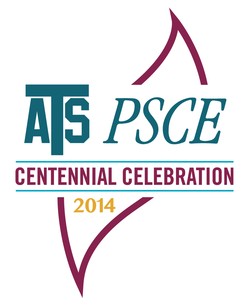RICHMOND, Va. ― Alumni/ae and friends from around the globe will gather at Union Presbyterian Seminary here Nov. 2-5 to celebrate the centennial anniversary of the Assembly’s Training School for Lay Workers (ATS), later known as the Presbyterian School of Christian Education (PSCE).
“The impact of ATS/PSCE on Christian education was felt around the world,” said Union Presbyterian Seminary President Brian K. Blount. “It will be a joy to welcome alumni/ae and friends back to campus to honor the ATS/PSCE legacy.”
Workshops, worship, class reunions, and a barn dance will all be highlights of the four day event, as well as the ATS/PSCE Centennial Banquet scheduled to take place on Nov. 4 at the downtown Marriott.
“We’ve been anticipating this centennial event the moment planning began two years ago,” says Associate Vice President of Alumni/ae Development Lynn McClintock. “Through worshipping, learning, joining around table, and telling stories of faith, we will celebrate one of the most unique schools of theological education in the history of the PC(USA).”
To register for the event, or to register for the ATS/PSCE Centennial Banquet, visit www.regonline.com/ats/pscecentennial .
Established in 1914 by the General Assembly of the Presbyterian denomination for the “training of lay workers,” ATS/PSCE specialized in training Christian educators, missionaries, and youth ministers for professional ministry.
“This institution stood alone,” said former PSCE president and current moderator of the Presbyterian Church (USA) General Assembly Heath Rada (M.A.’70). “Through every era, it taught the context of the Christian faith, and how to communicate it, and by doing so was beloved by Christians all around the world.”
In 1997, Union Theological Seminary and Presbyterian School of Christian Education federated as one institution. In 2009, the two schools were united under one banner: Union Presbyterian Seminary. ATS/PSCE’s legacy of Christian Education continues, and a Master of Arts in Christian Education is still offered.
“Together, we will celebrate 100 years of mission and ministry in Christian Education,” Blount said. “Studying together, playing together, dreaming together, we will envision the possibilities for the next generation of Christian educators.”
SAN ANSELMO, Calif. ― This fall marks an exciting time at San Francisco Theological Seminary. The Center for Innovation in Ministry launches with a two-day event October 16 and 17, the new M.Div. curriculum is in full swing, and construction on a new student village and faculty housing has begun.

New logo for San Francisco Theological Seminary —Courtesy of San Francisco Theological Seminary
To fully encapsulate this newness, SFTS is also embracing a whole new graphic look while honoring the historical roots and world-class academic programs that define SFTS.
The symbolism behind the Seminary's new logo is one filled with history, Christian roots, and the pursuit of theological education.
- Thetorch andflame are features that hail from the Seminary's historical seal, and symbolize the pursuit of knowledge and truth.
- The three-part flame represents the holy trinity, and the cross in the torch references the Seminary's historical roots in the Christian faith.
- The marquee shape is one found in the stained-glass windows of Stewart Chapel, and reminds us of our bonds to the Seminary's campus and the beauty found in its historical architecture.
This new look will be reflected in a special edition of Chimes that will hit mailboxes later this month, and will soon be mirrored on a new SFTS website in the weeks to come.
PRINCETON, N.J. ― In 2013, the Waldensian Church in Italy donated 355 separate grants to countries on every continent across the world. Three grants were awarded to United States organizations, and one of those three came to Princeton Theological Seminary.
The grant money was given for the Theological Commons (commons.ptsem.edu/), a project to expand digitization and the scope of content availability. The seminary is grateful for the $33,000 from the Waldensian Church to help expand the reach and accessibility of its extensive theological library to people around the world.
The Waldensian Church is a Protestant church in the Reformed tradition, with most adherents concentrated in Italy, Uruguay, Argentina, and the United States. The Italian Waldensians benefit from a provision of Italian law stipulating all taxpayers to donate a portion of their taxes to government-recognized churches or humanitarian projects. The Waldensian Church in Italy divides the money equally between Italian and international philanthropy among an incredible variety of beneficiaries.
DECATUR, Ga. — The Center for Lifelong Learning (CLL) at Columbia Theological Seminary and the Presbyterian Older Adult Ministries Network (POAMN) have announced a new partnership that will better equip churches and faith-based organizations to address the needs of older participants.
Beginning in April 2015, the CLL will be the host location for the Older Adult Ministry Certificate Program (OAM).
Jan L. McGilliard will serve as the OAM certificate program coordinator. She is a member of the POAMN executive committee, and is a past president of the organization. McGilliard holds an M.S. from Virginia Tech in Adult Development and Aging, a Certificate in Gerontology, Certifications in Intergenerational Programming and Lay Preaching. She is a Ruling Elder in the PC(USA) and lives in Blacksburg, Va.
“The program meets a very real need for congregations,” says McGilliard. “It is not uncommon for churches to be half or more older adults, and in small congregations, nearly all may be older. Clergy and Christian educators increasingly recognize the need to know more about the second half of life as it relates to their mission and ministry.”
The program is open to participants from any denomination or faith tradition. Four core classes and a capstone project are required to complete the Certificate Program. Two classes will be offered each spring at the CLL. Participants may begin with any of these scheduled classes. Pre-course reading and post-course assignments are required. The certificate course of study may be completed in 24-36 months.

